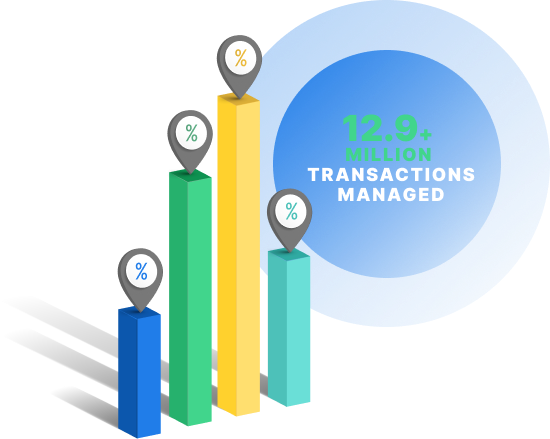Does SEO Really Work?
SEO has never been and never will be an exact science. That has led to great debates over the best ways to boost a website’s traffic. Some wonder whether SEO is even necessary as the Internet continues to evolve and search engines change their ranking factors and algorithms.
In fact, you may even wonder, “Does SEO really work?” Or you may be asking, “Is there a way to make my SEO work better?”
The answer to both of these questions is yes. In this article, we will discuss why SEO works, how it can pay off for any business, and discuss some of the SEO mistakes that you should keep an eye out for on your website.
Don’t forget, WebFX provides SEO services to clients all over the globe. Whether you need SEO for your Dallas business, or SEO in Detroit, WebFX can help you craft the perfect campaign!
Let’s start with a brief overview of what SEO is, and why companies should use it. If you’d like to speak with an SEO specialist, you can reach us at 888-601-5359.
Time to Level Up Your Sales
Our long list of services helps you grow every aspect of your business with marketing strategies that are proven to increase bottom-line metrics like revenue and conversions.
In the past 5 years, we’ve managed more than 14.9 MILLION transactions across our client base.

What is SEO?
So, what is SEO in digital marketing?
Search engine optimization is a collection of methods that website owners can use to increase their rankings in search engines like Google. Often abbreviated as SEO, these methods may include things like targeting keywords, improving site speed, making a site mobile-friendly, and so on.
Search engines determine the ranking of a website by examining on-page factors — that is, elements on your website that you can improve — and off-page factors like links. By improving both your on-page and off-page factors, you can boost your rankings for the keywords that are most relevant to your business.
By using the most current best practices in SEO, your company can rise in the search page rankings, increasing the chance that someone will click on your page when they do a search for your products, services, or industry.
Why SEO is important
Think about your own habits when you search for something online. How many pages of results do you click through when you do a Google search — three? Two? Or do you barely make it through one?
The higher up on the page your company appears in search results, the more likely someone is to click on your page. We all have short attention spans, so the higher up your company appears in search results, the more likely you are to attract attention from those who are quickly trying to find a solution to their problem or answer to their question.
SEO is the best way to push your company to the top of search engine rankings. It’s reliable, effective, and inexpensive.
But does SEO actually work?
SEO is not an exact science. The best practices for SEO evolve frequently because it’s based on ever-changing algorithms set up by the search engines to give people the best results. So, for example, if Google decided it favored websites with purple backgrounds over those with any other color, SEO best practices would have to change to match that parameter.
Google’s preferences are less random than favoring the color purple, of course, but you get the drift. An accepted practice in SEO a few years ago may not work now, and that leads to the perception that SEO does not work: if you are using outdated guidelines or practices, your site simply won’t rank well.
SEO only works when you use the current best practices. When you do this, Google and other search engines will increase your website’s ranking, leading to an increase in traffic and, in turn, conversions.
But when you do SEO incorrectly, it does not work. And that can also lead to the perception that SEO is ineffective.
How long does SEO take to work?
We have the answer below.
How poor SEO can hurt you
An SEO campaign that uses old, outdated best practices may keep you from ranking higher than you are now. You may even find your search ranking plummeting, or—worst of all—find that your website has been removed from search results completely.
Here are three major SEO blunders that can harm your website:
Buying links
Once a common practice, this scheme requires a site to pay for links in an attempt to convince Google that it is a worthy site. Since search engines favor sites with lots of backlinks, many years ago, it was easy to game the system by purchasing links from other sites.
However, Google prefers for links to be earned, not bought. Search engine algorithms now don’t consider just any link when they rank sites—they may ignore links from spam websites, or even ding your ranking because you have them. Additionally, if you are found to be buying links, you may receive a manual action, or penalty, that removes your site from the results altogether.
Instead of buying links, place your focus on earning them through fantastic content or by outreaching other websites.
Making pages without original content
This is a way to fluff out your site with little effort. In years past, webmasters used to create tons of pages on their website that reused content from their site, or even content stolen from other websites. Because quantity mattered more than quality, it was easy to manipulate the rankings simply by creating a lot of pages.
This no longer works. Your focus shouldn’t be on creating lots of pages—it should be on creating original content that answers questions, solves problems, and helps your visitors make decisions. This quality content can actually increase the engagement rates with your website, which in turn can help your rankings.
For example, if a manufacturer relied on copying-and-pasting content from competitors, that company wouldn’t see the results it expected. In comparison, a manufacturing SEO campaign that focused on original content would see better results.
Keyword Stuffing
In an attempt to rank their websites for every keyword possible, website owners used to engage in a practice known as “keyword stuffing.” This involved placing a high number of words in URLs, page titles, page content, and links. While this tactic was once very effective, Google caught on and made keyword stuffing ineffective.
While Google used to just look for the right keyword combo, now it searches for relevance and good content. Search engine algorithms now bump up only those sites that have all of those attributes (plus a few others, like links).
Additionally, keep in mind that real people will be visiting your website and looking at your URLs or page content. If you write content just for the purpose of getting keywords on a page, you will be disappointing your visitors. And the way they interact with your website as a result can hurt your rankings significantly.
Many of these tactics went out of favor years ago. But there are others that are just plain dishonest. That has led to mistrust of SEO in general.
The dangers of “black hat” SEO
Companies or individuals who knowingly engage in dishonest SEO practices are said to use “black hat SEO.” This form of SEO is designed to cut corners to deliver the desired results. And it’s frowned upon by search engines.
Sites engaging in black hat SEO will be punished. They may even receive manual penalties from Google, which are very difficult to recover from, and result in their site being kept out of search engine results.
Black hat SEO and the dire consequences that come along with it is a big part of why many people think SEO does not work. Like any industry, when you do something wrong, you pay a price. In this case, the price is lower or nonexistent search engine rankings.
Use smart SEO tactics to get results
The only way SEO will work is to use current best practices and stay abreast of any new developments in order to tweak your campaigns accordingly. When you do this, SEO really does work. The proof is in the results from a long list of WebFX clients who have seen huge lifts in traffic after starting SEO campaigns.
Now that you know that SEO really does work—when it’s done the right way, that is—take a look at our page on search engine optimization to learn more about how a leading agency like WebFX can help you improve your rankings and attract more customers through modern online marketing. Whether you’re searching for Harrisburg SEO solutions or Ann Arbor SEO services, or any other location, we’ve got you covered!
Related Resources
- 9 SEO Questions You’ve Asked (And We’ve Answered)
- Does SEO Increase Sales
- Does SEO Increase Traffic
- Is SEO Important for Every Business?
- Is SEO Still Relevant?
- SEO FAQ: How Do I Choose the Right Keywords?
- SEO FAQ: What Are the Different Kinds of Links?
- SEO FAQ: What is a Meta Description?
- SEO FAQ: Why Isn’t My Site on Google?
- 9 SEO Questions You’ve Asked (And We’ve Answered)
Marketing Tips for Niche Industries
- Attract More Clients with These 4 Tips for SEO for Audiologists
- Boost SEO for Lumber Companies with These 8 Simple Tips
- CBD SEO: 5 Tips for Creating a Cannabis SEO Strategy
- CPA SEO Services: Market Your CPA Firm with SEO
- Does SEO Work for Credit Unions?
- Driving Cutting-edge Results with WebFX
- Earn More Business with Pest Control SEO
- Ecommerce SEO
- Electrician SEO Services
- How SEO for Equipment Rentals Works: the Ultimate Guide


How Is Your Website's SEO?
Use our free tool to get your score calculated in under 60 seconds.









